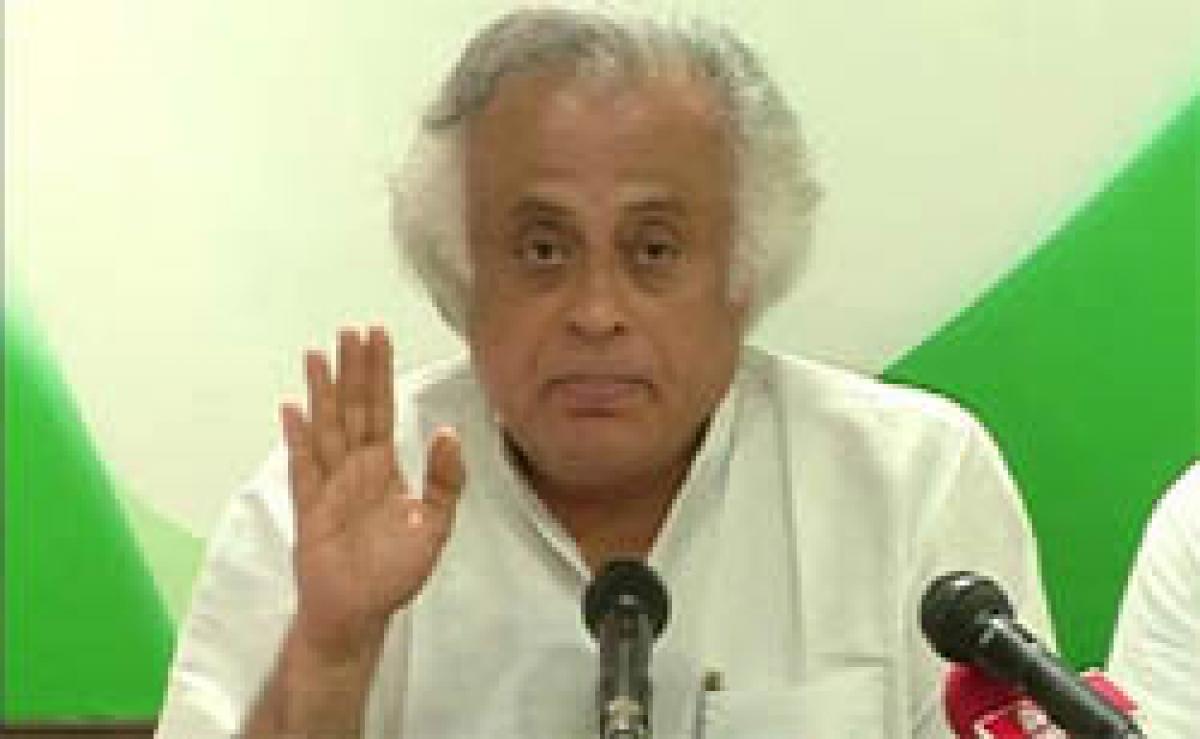Live
- BJP releases ‘charge sheet’ against BJD govt
- District Nodal Officer Venkataramana announced the intermediate results
- She team that stopped child marriages
- Medical devices sector needs separate rules, says industry body AiMeD
- Andhra Paper declares lockout
- Opposition INDIA bloc working on 'one year, one PM' formula: PM Modi
- Delhi HC quashes FIR for outraging woman's modesty, orders man to assist Traffic Police for a month as settlement
- 'Apologise to families of farmers who committed suicide in Vidarbha', Amit Shah dares Sharad Pawar
- SC Collegium recommends appointment of a permanent judge in Chhattisgarh HC, extension of term of two judges
- U20 Men's football nationals: Telangana, Sikkim earn full points with easy win
Just In

x
Highlights
The climate action plans submitted by countries are not going to be sufficient to cap global warming at 2° Celsius, former environment minister Jairam Ramesh said on Saturday and asked the nations to commit to review their current voluntary targets in the next five years to achieve this goal.
.jpg) The climate action plans submitted by countries are not going to be sufficient to cap global warming at 2° Celsius, former environment minister Jairam Ramesh said on Saturday and asked the nations to commit to review their current voluntary targets in the next five years to achieve this goal.
The climate action plans submitted by countries are not going to be sufficient to cap global warming at 2° Celsius, former environment minister Jairam Ramesh said on Saturday and asked the nations to commit to review their current voluntary targets in the next five years to achieve this goal.
Mr Ramesh said although India has set an ambitious target of having 40 per cent its electricity from non-fossil fuels by 2030, he cautioned that the remaining 60 per cent are going to come from fossil fuels and termed it as "India's climate conundrum".
Mr Ramesh was speaking at the two day GLOBE COP21 Legislators Summit in the National Assembly.
Later talking to reporters, Mr Ramesh said in two climate summits of 2009 and 2010, his stand that India will cut its emission intensity by 2020 and that every country has to take responsibility was criticised "severely" by the Bharatiya Janata Party (BJP) and the same stand is now being taken by Prime Minister Narendra Modi led government.
Mr Ramesh in his speech also outlined three quintessential - commitment (to implement INDCs), MRV (Monitoring, Reporting and Verification) of INDCs (Intended Nationally Determined Contributions) and rolling out of new generation of INDCs --for the success of COP21 in Paris.
"The INDCs are a bottom up process, but there must be a commitment in Paris to have a new generation of INDCs in five years from now, because these INDCs, submitted by countries ahead of COP21, is not going to be sufficient to meet the 2 degree Celsius target.
"We know that no country is going to unveil new INDCs in Paris, but what every country must undertake in Paris is to review the current portfolio of INDCs may be five years from now, revisit what it can do to increase the level of ambition of what it can do," he said.
INDCs which all countries have submitted are voluntary pledges that countries are making to cut carbon pollution.
He noted that Monitoring, Reporting and Verification (MRV) was a big issue in Copenhagen conference, when he had said that with the bottom up INDC architecture, one must have a top down architecture for MRV.
"If we leave Paris with the bottom up commitment architecture and a bottom up MRV architecture we are not going to do justice to the climate change challenge. So, second essential outcome as I see it is architecture of MRV, which will hold countries internationally accountable for the commitments that they have made voluntarily and domestically," Mr Ramesh said.
He pointed out that the third essential outcome from Paris should be that every country undertakes to unveil a 15-20 year low carbon growth path with intervening milestones so that there is some broad assessment of where we are going to be by the year 2030 or 2040 in terms of emissions.
"If these three outcomes are ensured in Paris, I think Paris would have made a major contribution," he said.

Next Story
More Stories
ADVERTISEMENT
© 2024 Hyderabad Media House Limited/The Hans India. All rights reserved. Powered by hocalwire.com







